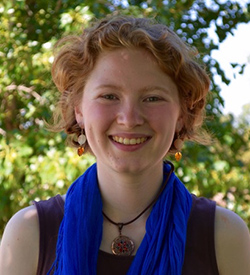
Graduate school is tough, but graduate students have a place to turn to for advocacy and support on campus.
Since it was established in 2005, UC Merced’s Graduate Student Association (GSA) has promoted graduate students’ rights and worked with the Graduate Division and other campus leadership to ensure that students’ best interests are met.
While the social aspects of the GSA are often widely known, President Shayna Bennett said there is more to the organization than one might expect.
“Our mission is threefold: to act as a link between the graduate student body and the administration; to advocate for the graduate students with administration, but also within the larger community and on the other UC campuses; and to help promote and grow a strong graduate community — socially and in research as well,” she said.

The GSA has already made headway on several of its 2020-2021 goals, said Bennett, who is a fourth-year Applied Mathematics Ph.D. student researching partial differential equations to model the spread of invasive species across heterogeneous landscapes.
One goal the student-led organization was able to accomplish early in the academic year was paying graduate students who serve on the Graduate Dean’s Advisory Council on Diversity.
“That was that was exciting for us,” she said.
Last fall, GSA executive officers worked with graduate student parents to draft a letter to the administration addressing their concerns about the possible privatization of the campus’s Early Childhood Education Center (ECEC). Bennett said the letter was met with overwhelming support. In December, the campus announced ECEC operations would resume Feb. 1 and remain part of its enterprises.
“The GSA is a united voice and it's one that has the ability to make change,” she said. “It's difficult — especially in a university — to make change on one’s own, but as a collective you have a collective voice.”
In addition, the group is currently working with interim Graduate Dean Chris Kello and Transportation and Parking Services to improve CatTracks routes for the remainder of the spring semester. The bus routes were cut back last March when the COVID-19 pandemic closed campus. With many graduate students back on campus working on research, Bennett said it’s imperative to add back those stops.
Kello, who works closely with the group’s executive officers, applauds their efforts.
“The work our GSA leaders have done on behalf of their fellow graduate students, especially during a pandemic, is really inspiring and impactful,” Kello said. “The Graduate Division partners with the GSA to provide lots of opportunities for developing leadership, networking and other skills that are valuable for our students to achieve their academic, intellectual and professional goals.”
The work our GSA leaders have done on behalf of their fellow graduate students, especially during a pandemic, is really inspiring and impactful.
The GSA continues to work on improving diversity, equity and inclusion on campus.
The group represents a diverse graduate student community by serving on numerous campuswide committees and councils. Internal Communications Officer and Applied Mathematics doctoral student Jordan Collignon said improving communication and representation on committees has been another key initiative.
“'We're trying to get a structure in place that allows us to communicate with these groups across campus more efficiently,” he said.
This May, the group is collaborating with the Center for Engaged Teaching and Learning to provide graduate student specific diversity training led by Professor Eileen Camfield.
The GSA hosts a general meeting open to all master’s and doctoral students from 4-5 p.m. on the first Wednesday of every month. To provide a deeper look into the GSA and keep graduate students up to date on happenings, Collignon and Internal Vice President Benny Nguyen launched an e-newsletter in the fall. The spring 2021 issue is now available here.
The GSA typically hosts in-person on- and off-campus events and outings, some in partnership with the Graduate Division, throughout the year to give grad students some much-deserved time away from their research to socialize and recharge.
Bennett said the group will host more events this academic year than it has in the past 15 years, despite the pandemic.
“Online events are much more sustainable given our financial resources,” she said. “We're going to recommend the next executive officers’ cohort incorporate some online events even when we're back on campus because we are seeing so much success with them.”
For second-year Applied Mathematics Ph.D. student Adam Binswanger, events such as the bi-weekly trivia night provide him a much-needed opportunity to see graduate students from other areas, at least virtually.
“These events for me are a stress relieving activity and something fun that I consistently look forward to,” said Binswanger, a graduate program delegate who volunteers to host the trivia nights. “I have gotten to know some grad students a lot better from the fun interactions we have during these events. I most certainly wouldn't have had the chance had these events not happened.”
Brenda Ortiz

Senior Public Information Representative
Office: (209) 228-4203
Mobile: (209) 628-8263






